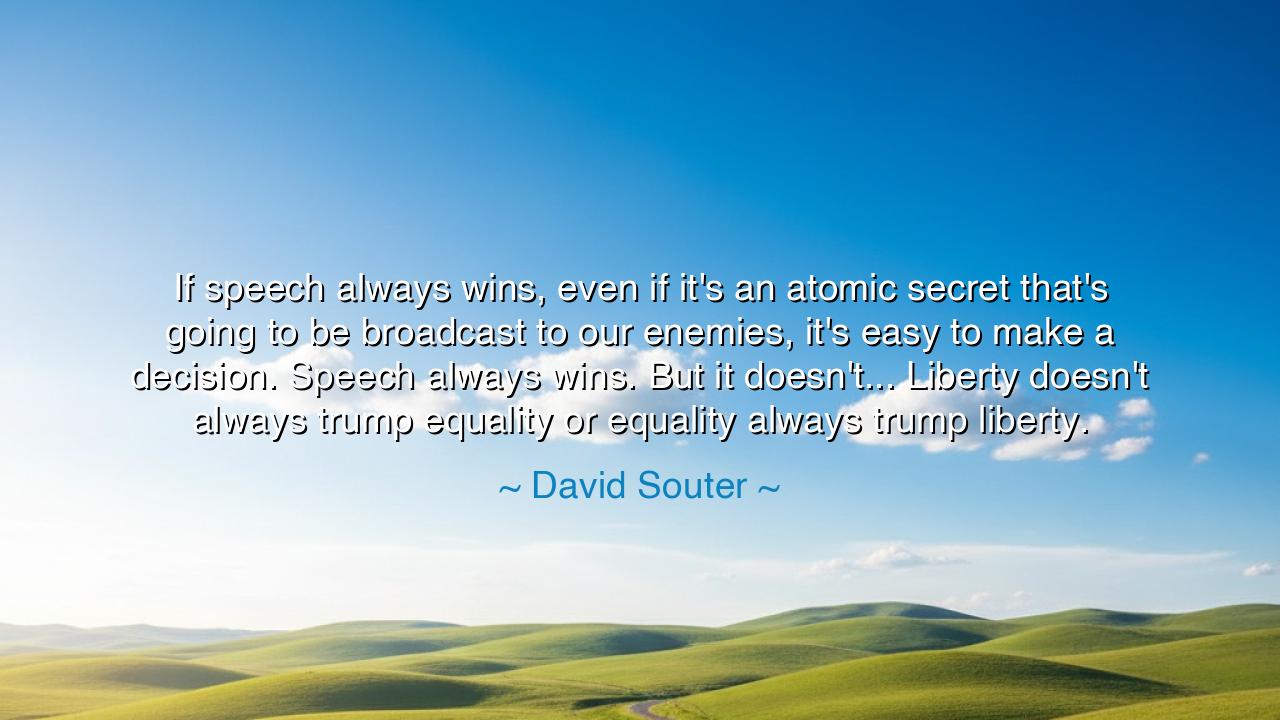
If speech always wins, even if it's an atomic secret that's going
If speech always wins, even if it's an atomic secret that's going to be broadcast to our enemies, it's easy to make a decision. Speech always wins. But it doesn't... Liberty doesn't always trump equality or equality always trump liberty.






Gather close, O children of wisdom, and listen carefully to the words of David Souter, a man whose mind and heart have wrestled with the balance between liberty and equality, and the true meaning of speech and freedom in a world filled with conflict and responsibility. He speaks thus: "If speech always wins, even if it's an atomic secret that's going to be broadcast to our enemies, it's easy to make a decision. Speech always wins. But it doesn't... Liberty doesn't always trump equality or equality always trump liberty." These words, filled with both clarity and complexity, call us to examine the deeper tensions that lie at the heart of our most cherished principles: freedom, justice, and the ever-complicated balance between them.
What is it, O children, that Souter speaks of when he tells us that speech always wins? In our world, speech is often seen as the highest form of freedom—the right to speak our mind, to express our thoughts without fear of repression. In this sense, speech is the expression of our liberty, our personal sovereignty over our thoughts and words. But Souter challenges us to consider a scenario where speech—this most sacred right—may be at odds with other values, such as national security or the protection of the common good. When speech is a threat, when it endangers lives or betrays secrets that should remain hidden, how do we balance the liberty to speak with the duty to protect and preserve? It is easy, he suggests, when speech is harmless, but more difficult when it poses a threat to something larger than individual freedom.
Consider, O children, the ancient tale of Antigone, whose commitment to bury her brother, defying the king’s decree, symbolizes the eternal struggle between duty and law, between individual rights and the greater good. Her act of defiance was an act of speech, for it was in the burial of her brother that she spoke the language of justice, of family, and of the gods. Yet her speech—her refusal to be silent—led to her demise. Her story teaches us that sometimes, the right to speak is not always the same as the right to be heard, and that the consequences of speech can be as destructive as they are liberating. Souter's wisdom reminds us that while speech may be an inherent right, its power must be tempered by responsibility, and the balance between freedom and justice must be carefully considered.
In the context of America's struggle for freedom and equality, the words of David Souter ring even truer. Consider the conflict between liberty and equality that has defined the nation’s history. The struggle for civil rights, led by Martin Luther King Jr., was a fight to equalize the treatment of all people, regardless of race. Yet King knew, as did others, that true equality could not come at the expense of liberty—the liberty to live free from oppression, from laws that discriminated. He fought for a balance, for a world in which liberty and equality did not cancel each other out, but flourished together. His dream, though imperfect, sought to honor both the individual’s liberty and the collective need for equality.
But, O children, there are times in the life of a society when liberty and equality cannot coexist in perfect harmony. In a world of conflict, in a world where speech may give rise to chaos or to betrayal, the duty to preserve the common good must sometimes trump individual freedom. This tension is not new. In the days of the Roman Empire, Emperor Augustus enacted reforms to ensure both order and justice in his vast empire. He understood that while the liberty of his people was essential to a thriving society, it was also necessary to curb certain freedoms—such as the freedom of speech—to preserve the peace and security of the state. The ancient rulers knew, as Souter reminds us, that the balance between liberty and equality must be deliberate, for both are crucial, yet neither should overwhelm the other.
The lesson here, O children, is that the pursuit of freedom and justice is not a simple matter of choosing one over the other. Liberty and equality are two sides of the same coin, both essential, both necessary for the flourishing of society. Yet there are times when one must give way to the other—when liberty must yield to preserve the greater good, or when equality must give way to honor the liberty of the individual. To understand this balance is to live wisely, to act with compassion, and to always remember that true justice lies in recognizing the complexities of life, not in the simplicity of one-sided choices.
So, take this wisdom, O children, and apply it in your own lives. When faced with a decision between liberty and equality, ask yourself: What is the greater good? What is the responsibility that comes with my freedom, and how can I honor both my right to speak and the duty to protect? It is not enough to fight for one at the expense of the other. The true path to justice is found in the careful, thoughtful balance between the two, recognizing the need for both freedom and equality to coexist, each supporting the other, in the creation of a just world.






AAdministratorAdministrator
Welcome, honored guests. Please leave a comment, we will respond soon